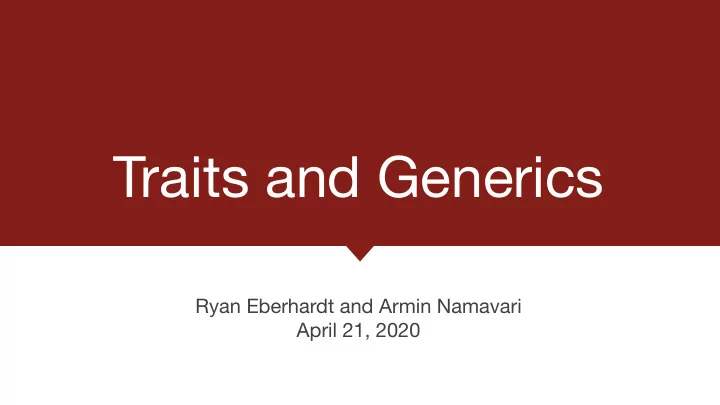

Traits and Generics Ryan Eberhardt and Armin Namavari April 21, 2020
The Plan for Today Introduce traits ● Introduce generics ● See examples in real world systems! (if time permits) ● Next time: wrap up traits/generics + discuss smart pointers! ● Next week: Multiprocessing pitfalls and multiprocessing in Rust! ● *Heads up: I will be switching between slides/code — hopefully the context ● switching won’t incur too much overhead.
Please ask Questions! Or else I will happily blast through the slides ● Feel free to unmute yourself ● I can also look for hands when I pause for questions ●
Grouping Related Functionality Together What are some ways you’ve seen this in other languages? ● Sources: https://www.chegg.com/homework-help/questions-and-answers/c-programming-create-required-classes- header-implementation-files-implement-following-hier-q18713018, https://qph.fs.quoracdn.net/main- qimg-4e054f260faefa31e66e02d2345091f3.webp
Traits — Some Common Ones in Rust What can this type do? ● Display (lecture example) ● Clone/Copy (exercises) ● Iterator/IntoIterator (exercises) ● Eq/Partial Eq (exercises) ● Allows us to override functionality ● Drop (lecture example) ● Deref (later) ● Allows us to define default implementations ● ToString (will see later how this interacts with Display) ● Allows us to overload operators ● +, -, *, /, >, <, ==, !=, etc. (lecture example) ●
Linked List Traits Playground example here (from last lectures notes) ● Let’s see Display and Drop in action! ●
Deriving Traits Provide reasonable default implementations ● Common w/ Eq/PartialEq, Copy/Clone, Debug ● PartialEq for f64: NaN != NaN ● Point playground example ● pub trait Copy: Clone { // Empty. }
Defining Your Own Traits What if we wanted a trait to describe things that have (L2) norms? e.g. ● Vec<f64>, or say our new Point type. ComputeNorm example with Point (also, overloading “+”) ● Playground link ● Associated type with Add — will pop up with iterators too! ●
Generics You’ve seen them before: Vec<T>, Box<T>, Option<T>, Result<T, E> ● Soon: LinkedList<T> (exercises) ● MyOption<T>, MatchingPair<T> ● Playground link ●
Trait Bounds and Syntax in Functions Sometimes we want to specify trait bounds — i.e. for what kinds of types ● can we call this function? Generalize previous example: playground link ● identity_fn, print_excited, print_min ● Playground link ●
Trait Bounds in ToString impl<T: fmt::Display + ? Sized> ToString for T { #[inline] default fn to_string(&self) -> String { use fmt::Write; let mut buf = String::new(); buf.write_fmt(format_args!("{}", self)) .expect("a Display implementation returned an error unexpectedly"); buf.shrink_to_fit(); buf } }
Zero Cost Abstractions How expensive is it to keep track of all this information? ● Thanks to the magic of the Rust compiler, it’s not too expensive! ● e.g. Generics => multiple versions of compiled code for different types ● Compiler infers which one to use based on type of a piece of data ● Read more here ●
Examples in Real World Systems (e.g. Tock) Tock is an embedded OS for low-powered IoT (Internet of Things) devices ● It’s written in Rust! ● You can see traits everywhere ● Here is just one file ● Using traits to define a syscall interface ● You can’t do anything like this in C! ●
Additional Reading CS242 Notes on Traits ● About Common Rust Traits ● The Rust Book on Traits ●
Recommend
More recommend